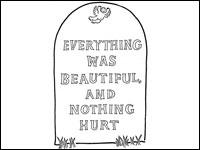[CLIP]:
KURT VONNEGUT:
This is Kurt Vonnegut, WNYC's reporter on the afterlife. During yesterday's controlled near-death experience, I had the pleasure of speaking––
[END CLIP]
BROOKE GLADSTONE:
One of the last things Kurt Vonnegut wrote was a collection of essays written from the Pearly Gates, or what he described as "the hundred yards or so of vacant lot between the far end of the blue tunnel and the Pearly Gates."
As he explained it on the radio and in the book, God Bless You, Dr. Kevorkian, Vonnegut would be strapped to a gurney at the lethal injection facility in Huntsville, Texas, rendered by the good doctor mostly, but not altogether, dead and dispatched to interview the famous and not-so-famous deceased, ranging from a bar owner and a teacher, to Isaac Newton, James Earl Ray, William Shakespeare, Hitler.
On the Media has a special affection for this work by the late, great Vonnegut, because, as you heard, he conducted these interviews as a reporter for our producing station, WNYC.
[MUSIC UP AND UNDER] [CLIP]
KURT VONNEGUT:
During what has been almost a year of interviewing completely dead people while only half-dead myself, I asked St. Peter again and again to meet a particular hero of mine. He is my fellow Hoosier, the late Eugene Victor Debs of Terre Haute, Indiana. He was five times the Socialist Party's candidate for President back when this country still had a strong Socialist Party.
And then, guess what? Yesterday afternoon, none other than Eugene Victor Debs, organizer and leader of the first successful strike against a major American industry, the railroads, was waiting for me at the far end of the blue tunnel.
We hadn't met before. This great American died in 1926 at the age of 71, when I was only [LAUGHS] four years old. I thanked him for words of his, which I quote again and again in lectures. "As long as there is a lower class, I am in it. As long as there is a criminal element, I am of it. As long as there is a soul in prison, I am not free."
He asked me how those words were received here on Earth in America nowadays. I said they were ridiculed. People snicker and snort, I said. He asked what our fastest-growing industry was. The building of prisons, I said. What a shame, he said.
And then he asked me, how is the Sermon on the Mount going over these days? And then he spread his wings and he flew away.
[MUSIC UP AND UNDER]
BROOKE GLADSTONE:
"I say in speeches," Vonnegut said, "that a plausible mission of artists is to make people appreciate being alive, at least a little bit. I am then asked if I know of any artists who pulled that off. I reply, 'The Beatles did.'" Well, obviously, not just the Beatles.
[END OF CLIP] [MUSIC UP AND UNDER]
BOB GARFIELD:
That's it for this week’s show. On the Media is produced by Megan Ryan, Tony Field, Jamie York and Mike Vuolo, and edited – by Brooke. Dylan Keefe is our technical director and Jennifer Munson our engineer. We had help from Christopher Worth, Peter Garner and Andy Lanset. Our webmaster is Amy Pearl.
BROOKE GLADSTONE:
Katya Rogers is our senior producer and John Keefe our executive producer. Bassist/composer Ben Allison wrote our theme. You can listen to the program and find free transcripts, MP3 downloads and our podcast at onthemedia.org and email us at onthemedia@wnyc.org. This is On the Media from WNYC. I'm Brooke Gladstone.
BOB GARFIELD:
And I'm Bob Garfield.

